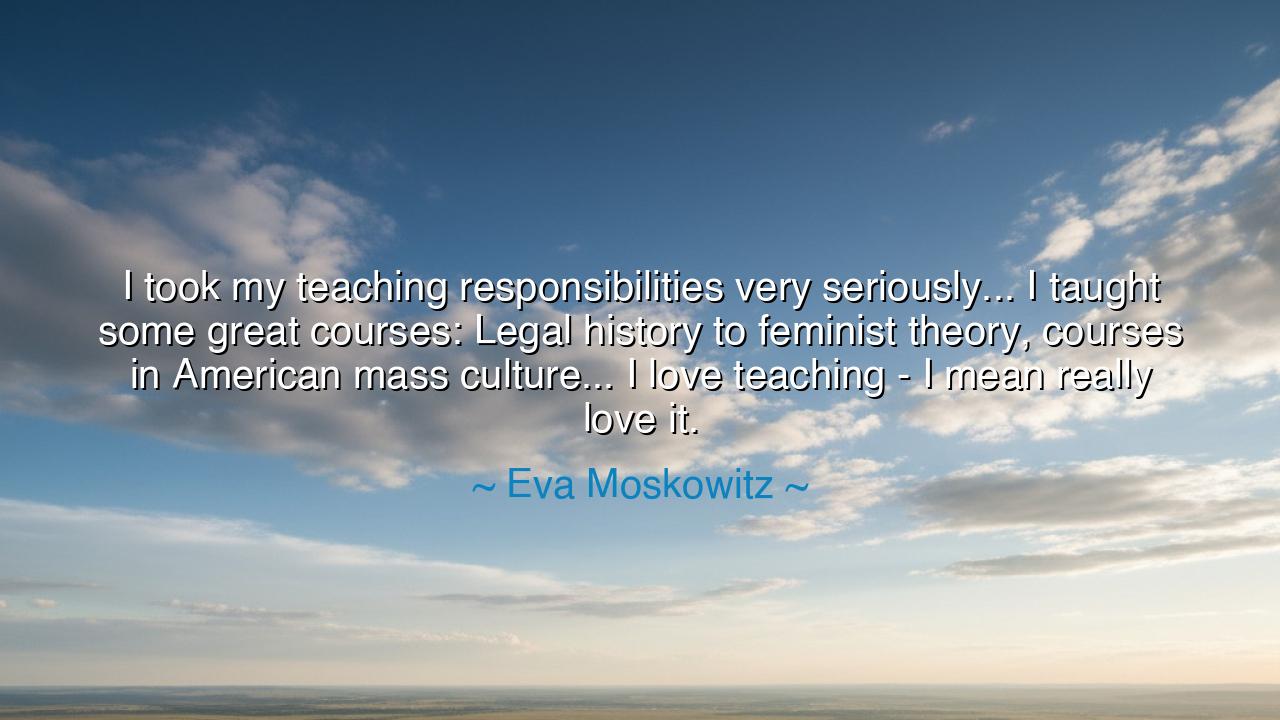
I took my teaching responsibilities very seriously... I taught
I took my teaching responsibilities very seriously... I taught some great courses: Legal history to feminist theory, courses in American mass culture... I love teaching - I mean really love it.






When Eva Moskowitz said, “I took my teaching responsibilities very seriously... I taught some great courses: Legal history to feminist theory, courses in American mass culture... I love teaching — I mean really love it,” she spoke from the soul of one who has tasted the sacred duty of the teacher — that noble calling through which knowledge becomes legacy, and legacy becomes civilization. In her words, there burns not mere enthusiasm, but reverence — a recognition that teaching is not an occupation, but a vocation, a lifelong bond between mind and spirit. Her love is not the fleeting passion of novelty, but the enduring devotion of one who knows that through education, the flame of humanity is kept alive.
In the style of the ancients, her words would be spoken like a hymn to wisdom. The teacher, they believed, was both a guide and a guardian — the living bridge between ignorance and understanding, between darkness and light. In ancient Greece, to teach was to shape the soul of the city. The philosopher Socrates walked barefoot through the streets of Athens, questioning, provoking, awakening — not for fame or wealth, but because he knew that a mind stirred to thought is a soul awakened to freedom. So too did Moskowitz, in her own time, embrace this sacred art. Her courses — from legal history to feminist theory, from American mass culture to the laws that govern society — were not merely lectures but invitations to think, to challenge, to become more than one was before.
The origin of this quote lies in Moskowitz’s early career before she became known for her work in education reform. She was a scholar and professor, deeply engaged in the world of ideas. Yet even then, her passion for teaching surpassed her interest in status or position. She saw the classroom not as a stage of authority, but as a living organism — a place where minds converge, collide, and evolve. To her, each subject, whether legal or cultural, was a way of exploring human potential — of tracing the path by which people shape laws, and laws shape lives. Her joy in teaching reveals an ancient truth: that true educators do not merely convey information — they awaken identity.
Her devotion recalls the spirit of Hypatia of Alexandria, the great philosopher who taught in an age when ignorance sought to silence wisdom. Hypatia’s students were drawn not by obligation but by awe; her classroom, like Moskowitz’s, was a sanctuary of inquiry. Both women understood that teaching is an act of courage — for to teach is to challenge the static order of things, to insist that knowledge belongs not to the few but to the many. In this sense, Moskowitz’s statement is not only a declaration of love for teaching, but also a defense of enlightenment itself — the belief that education is the foundation of liberty, and that every great society rises or falls upon how deeply it honors its teachers.
Her mention of legal history and feminist theory is not accidental; these are subjects rooted in the struggle for justice, equality, and truth. To teach them is to equip minds to question power and to demand fairness. In doing so, she joins a long lineage of educators who saw learning as a form of resistance against tyranny — from Confucius, who taught virtue as the foundation of governance, to Mary Wollstonecraft, who fought for women’s education as the key to their liberation. Moskowitz’s teaching, therefore, is more than academic — it is moral. It affirms that every idea shared in the classroom is a seed planted in the soil of society, destined to grow into change.
Yet her words carry more than intellect — they carry emotion, the pulse of one who has felt the miracle of connection that occurs when a teacher meets a willing mind. “I love teaching — I mean really love it,” she says, and in those words, there is no pretense. It is the love of one who has watched understanding dawn in another’s eyes, who has seen confusion transform into confidence. That is the quiet triumph of the true teacher — to labor unseen, to pour light into others, knowing that one’s greatest work is measured not in accolades, but in the growth of those who come after.
The lesson of her words is eternal: to teach is to serve humanity’s future. In every age, from the temples of Egypt to the modern classroom, the teacher’s role has remained the same — to preserve wisdom, to awaken curiosity, to kindle courage. Let those who teach remember Moskowitz’s devotion — to take their responsibility seriously, to love the act of teaching not for its rewards but for its meaning. And let those who learn honor their teachers, for in honoring them, they honor the chain of enlightenment that binds all generations.
So let her words be a torch passed forward: that in every school, every hall, every humble corner where knowledge is shared, the spirit of love and responsibility must guide the hand that teaches. For a society’s greatness does not lie in its wealth or power, but in how deeply it cherishes its seekers of truth — and in how fiercely its teachers love the act of helping others see.






AAdministratorAdministrator
Welcome, honored guests. Please leave a comment, we will respond soon